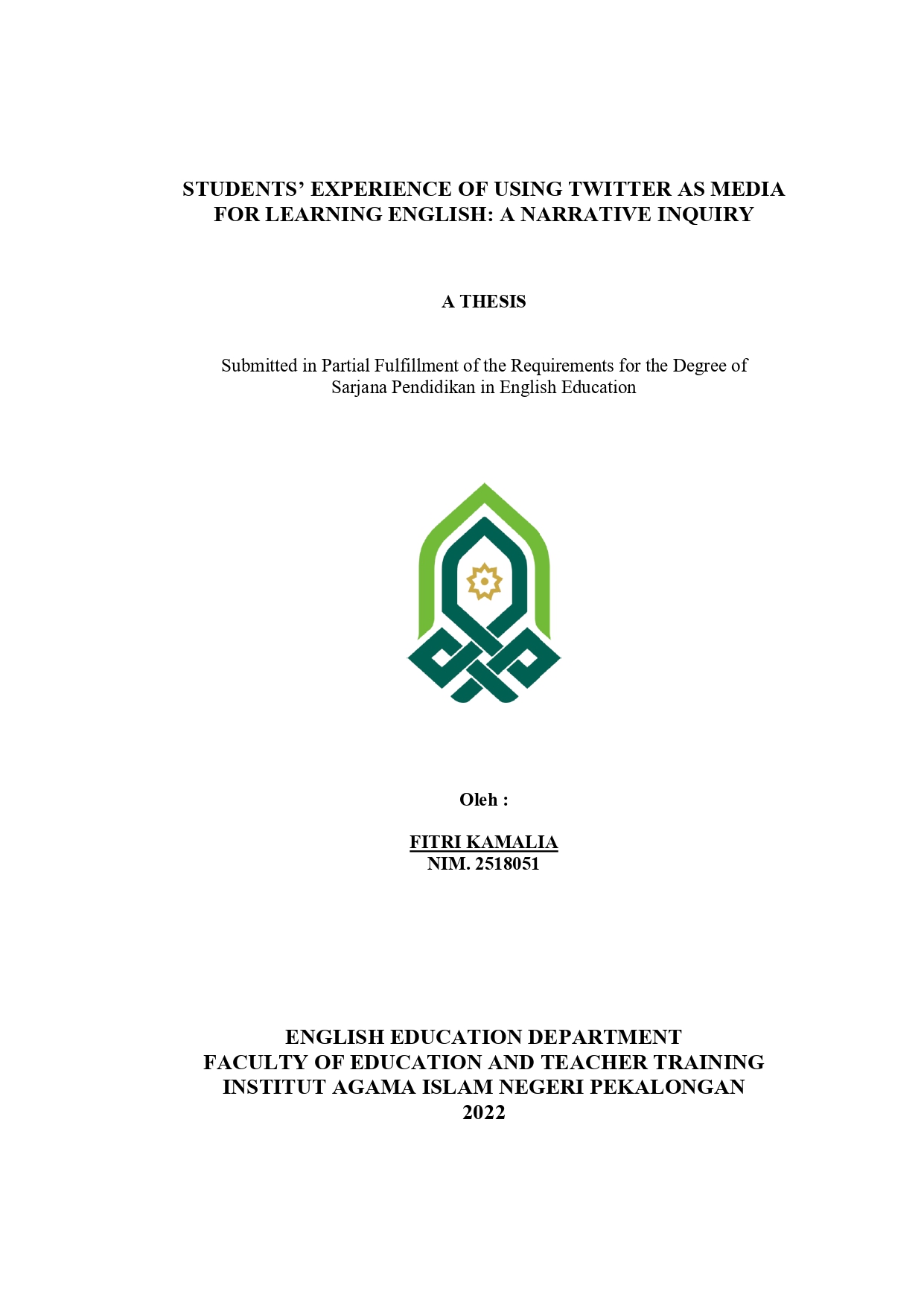
SKRIPSI TADRIS BAHASA INGGRIS
Students' Experience of Using Twitter as Media For Learning English : A Narrative Inquiry
Social media gives several opportunities for students to improve their English
language skills. This study aimed to report university students experience during
learning English use Twitter as a self-learning. The researcher used semi
structure interview to collect the data. The data was analyzed using thematic
analysis to find the themes then used positive and negative theory to explore
students’ feeling and experience in using Twitter. The findings showed students’
experienced positive and negative emotions during learning English. Positive
feelings existed because the application had helped them in English learning.
Meanwhile, for some students, Twitter has a negative impact for them such as
students became addicted and overloaded information leading to confusion.
Keywords: Twitter, English Learning, Experience.
REFERENCES
Abbas., Gulzar., Hussain. (2019). The Impact of Social Media (Facebook and YouTube) on Vocabulary Acquisition of ESL Learners. Journal of Communication and Cultural Trends 29-33 https://doi.org/10.32350/jcct
Al-Jarrah, J. M., Talafhah, R. H., & Al-Jarrah, T. M. (2019). social networking sites and English language learning: Jordanian EFL learners ‘practices and experiences. European Journal of English Language Teaching
Ayuningtyas, P. (2018). Whatsapp: Learning on the go. Metathesis: Journal of English Language, Literature, and Teaching, 2(2), 159–170. https://doi.org/10.31002/metathesis.v2i2.629
Bakeer, A. M (2009). Effects of Information and Communication Technology and Social Media in Developing Students’ Writing Skill: A Case of Al-Quds Open University. Ferris, D. (2011). Treatment of error in second language student writing. University of Michigan
Blachowicz and Fisher (2013). Meeting the Literacy Development Needs of Adolescent English Language Learners Through Content-Area Learning. Part II. New York: Brown University. In Meltzer and Hamann, 2005.
Cahyono (2018). The Teaching of EFL Vocabulary in the Indonesia Context: The State of The Art. Indonesian Journal of Teaching of English as a Foreign Language
Chou, C. M. (2014). Social media characteristics, customer relationship and brand equity. The Journal of Applied Business and Economics, 16(1), 128–145
Connelly, F. M., & Clandinin, D. J. (1990). Stories Of Experience and Narrative Inquiry. Educational Researcher, 19(5), 2-14
Deddy Apriyanto Bandjar (2018). Dampak Pengguaan Twitter Terhadap Pembelajaran Bahasa Inggris
Fitri Hardiana. (2019). The Use Of Social Media Among English Education Students For Solving Problems In Completing Their Skripsi
Habibi, A., Mukminin, A., Riyanto, Y., Prasojo, L. D., Sulistiyo, U., Sofwan, M., & Saudagar, F. (2018). Building an online community: Student teachers’ perceptions on the advantages of using social networking services in a teacher education program. Turkish Online Journal of Distance Education, 19(1), 46–61.
Kaplan, A. M., & Haenlein, M. (2010). Users of the world, unite! The challenges
Latifah Rakhma Romadhon., Emma Dwi Indriani., & Kunrat Nur Setiawan. (2020) Writing Short Stories Using Twitter as a Media for Student’s Writing Skills English Teaching Journal
Lauver & Swan (2015) The influence of the mother tongue on second language vocabulary acquisition and use. In Vocabulary: Description, Acquisition and Pedagogy, ed. N. Schmitt and M. McCarthy, 156–180. Cambridge: Cambridge University Press
Monica, & Anamaria, P. (2014). The Impact of Social Media on Vocabulary Learning Case Study-Facebook. Annals of the University of Oradea, Economic Science Series, 23(2) Nagi (1988). Vocabulary Instruction and Reading Comprehension
Ketersediaan
| 23SK2325034.00 | SK TI 23.034 FIT s | My Library (Lantai 3. Local Content) | Tersedia |
Informasi Detail
- Judul Seri
-
-
- No. Panggil
-
SK TI 23.034 FIT s
- Penerbit
- Pekalongan : Jurusan S-1 Tadris Bahasa Inggris FTIK UIN K.H. Abdurrahman Wahid Pekalongan., 2022
- Deskripsi Fisik
-
xiv, 29 hlm., 30 cm; Bibliografi: 30-32
- Bahasa
-
Inggris
- ISBN/ISSN
-
-
- Klasifikasi
-
371. 358
- Tipe Isi
-
-
- Tipe Media
-
-
- Tipe Pembawa
-
-
- Edisi
-
-
- Subjek
- Info Detail Spesifik
-
-
- Pernyataan Tanggungjawab
-
Fitri Kamalia (2518051)
Versi lain/terkait
Tidak tersedia versi lain
Lampiran Berkas
Komentar
Anda harus login sebelum memberikan komentar
 Karya Umum
Karya Umum  Filsafat
Filsafat  Agama
Agama  Ilmu-ilmu Sosial
Ilmu-ilmu Sosial  Bahasa
Bahasa  Ilmu-ilmu Murni
Ilmu-ilmu Murni  Ilmu-ilmu Terapan
Ilmu-ilmu Terapan  Kesenian, Hiburan, dan Olahraga
Kesenian, Hiburan, dan Olahraga  Kesusastraan
Kesusastraan  Geografi dan Sejarah
Geografi dan Sejarah